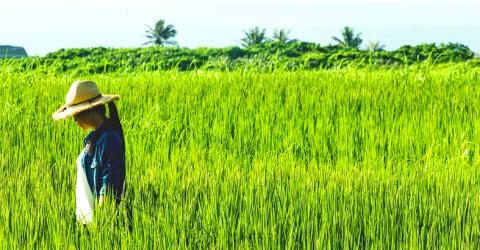There is nothing fancy about Wawa No Cidal (太陽的孩子). It tells the straightforward story of an Amis woman trying to re-cultivate the farmland in her ancestral village. As simple as the production is, the film is also one of the most genuine and sincere works of filmmaking that have come out this year. Directing duo Cheng Yu-chieh (鄭有傑) and Lekal Sumi turn their lens to an Amis village on Taiwan’s east coast, creating a heartfelt human drama tackling the issues that are very close to the heart of anyone who is concerned with what has happened to the country’s indigenous communities.
The film begins with Panay, played by Amis musician and TV host Ado Kaliting Pacidal, returning home to the Amis community Makutaay in Hualien County. Like most villagers, Panay works in the city, leaving her daughter Nakaw (Dongi Kacaw) and son Sera (Rahic Gulas) in the care of her father, played by village elder Kaco Lekal.
Her father’s recently diagnosed cancer, however, forces Panay to rethink her priorities. She quits her job and moves back to the village to care for her family. But she soon finds out that her home is not what it used to be.

Photo courtesy of Activator Marketing
For one thing, exploitative tourism has caused damage to the environment and disrupted the local way of life. Many villagers now make money by singing and dancing to the influx of Chinese visitors who bring trash, noise and traffic jams to the once tranquil hamlet by the sea. Meanwhile, the development frenzy grips the region as local authorities and big corporations join forces to build parks and resorts on Amis ancestral land.
In an effort to help villagers gain more sources of income, Panay explores the possibility of re-cultivating the tribal farmland that has lain fallow for years. Her plan elicits doubts and suspicion among residents, while local bureaucrats prefer to support big, lucrative development projects instead of spending a few bucks on fixing dilapidated irrigation canals.
Determined, Panay manages to get a small university research grant and successfully persuades villagers to work together to restore the terrace to its former glory. Rice grows, turning the field into a lush vista of verdant green.
But little do the villagers know that the developer, backed up by the police, has other plans in mind.
A sense of authenticity permeates Wawa No Cidal. The mostly non-professional actors are Amis who face the same real-life dilemma as the characters in the film. The directors tackle the complex problems facing Taiwan’s indigenous communities.
The level of eloquence and lucidity partially owes to young filmmaker Sumi. Having grown up in Tainan, the director has reportedly returned to Makutaay, the birthplace of his mother, to seek his indigenous roots. His experience is no doubt told through the character of Panay, who not only returns home to reconnect with her heritage but is driven to earn the acceptance and trust of her people.
Consequently, the film is mostly based on real events. One seemingly far-fetched sequence in the film, for example, refers to the controversy a few years ago in which the local government seized Aboriginal land in Makutaay because the township office managed to lose the documents concerning the villagers’ applications for registering their land as a reserve.
Despite a somewhat flawed narrative and low production values, Wawa No Cidal is recommended to anyone who wishes to gain a basic understanding of the issues facing the country’s indigenous communities.

Mongolian influencer Anudari Daarya looks effortlessly glamorous and carefree in her social media posts — but the classically trained pianist’s road to acceptance as a transgender artist has been anything but easy. She is one of a growing number of Mongolian LGBTQ youth challenging stereotypes and fighting for acceptance through media representation in the socially conservative country. LGBTQ Mongolians often hide their identities from their employers and colleagues for fear of discrimination, with a survey by the non-profit LGBT Centre Mongolia showing that only 20 percent of people felt comfortable coming out at work. Daarya, 25, said she has faced discrimination since she

It is one of the more remarkable facts of Taiwan history that it was never occupied or claimed by any of the numerous kingdoms of southern China — Han or otherwise — that lay just across the water from it. None of their brilliant ministers ever discovered that Taiwan was a “core interest” of the state whose annexation was “inevitable.” As Paul Kua notes in an excellent monograph laying out how the Portuguese gave Taiwan the name “Formosa,” the first Europeans to express an interest in occupying Taiwan were the Spanish. Tonio Andrade in his seminal work, How Taiwan Became Chinese,

April 21 to April 27 Hsieh Er’s (謝娥) political fortunes were rising fast after she got out of jail and joined the Chinese Nationalist Party (KMT) in December 1945. Not only did she hold key positions in various committees, she was elected the only woman on the Taipei City Council and headed to Nanjing in 1946 as the sole Taiwanese female representative to the National Constituent Assembly. With the support of first lady Soong May-ling (宋美齡), she started the Taipei Women’s Association and Taiwan Provincial Women’s Association, where she

More than 75 years after the publication of Nineteen Eighty-Four, the Orwellian phrase “Big Brother is watching you” has become so familiar to most of the Taiwanese public that even those who haven’t read the novel recognize it. That phrase has now been given a new look by amateur translator Tsiu Ing-sing (周盈成), who recently completed the first full Taiwanese translation of George Orwell’s dystopian classic. Tsiu — who completed the nearly 160,000-word project in his spare time over four years — said his goal was to “prove it possible” that foreign literature could be rendered in Taiwanese. The translation is part of